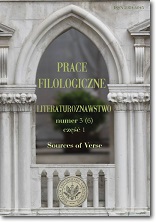“The Sense of Form” in the Poetry of Wisława Szymborska and Czesław Miłosz
“The Sense of Form” in the Poetry of Wisława Szymborska and Czesław Miłosz
Author(s): Joanna Grądziel-WójcikSubject(s): Literary Texts
Published by: Wydział Polonistyki Uniwersytetu Warszawskiego
Keywords: Czesław Miłosz; Wisława Szymborska; poezja polska w XX wieku; utwór poetycki; Czesław Miłosz; Wisława Szymborska; Polish poetry of the 20th century; poem
Summary/Abstract: The article addresses the sources behind the poems of Wisława Szymborska and Czesław Miłosz. The focal point of Miłosz’s poetry is the concept of Entirety, which is intertwined with his religious worldview, whereas the world in Szymborska’s poetry lacks a metaphysical structure based on a number of divine certainties. These fundamental differences are observed in the metrical decisions made as the shape of the poem becomes a test for the infinite, remaining outside reality. For both authors “the order, rhythm, form” seem to be the reasons for the existence of poetry and as such protect it from chaos and nothingness. However, Szymborska “thinks in verse” differently than Miłosz, undertaking her own “struggle with a poem”. This aspect of her work is analyzed in the article with reference to “I’m working on the world” and “Vermeer.”
Journal: Prace Filologiczne. Literaturoznawstwo [PFLIT]
- Issue Year: 2013
- Issue No: 3 (6)
- Page Range: 91-106
- Page Count: 16
- Language: English

